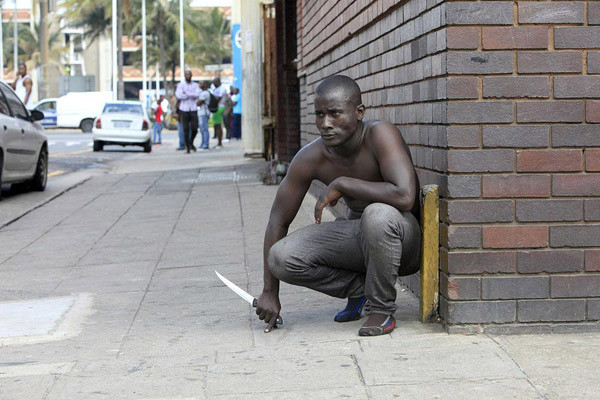PBS: Escaping Eritrea … [Read More...] about ካብ ውሽጢ ቤት ማእሰርታት ኤርትራ
Kenya ready to evacuate citizens from South Africa
Thursday, 16 April 2015, Daily Nation (Kenya)
The Kenyan government is ready to evacuate citizens from South Africa due to rising anti-immigrant attacks, says it is monitoring the situation closely. This follows widespread attacks against foreign nationals and their property in several cities and towns in South Africa in the past one week. According to the government, there are no reported cases of causalities involving members of the Kenyan community.
“The Kenyan Mission in South Africa is working closely with local leaders within the Kenya Diaspora to monitor the situation and is ready to render assistance to any Kenyan national who may be adversely affected,” said a statement from the ministry of foreign affairs. About 400 Kenyans are in the central business district of Durban; about 100 work in the informal sector, while another 50 are employees of two sugar farms in the outskirts of Durban city, said the statement. In addition, there are about 300 students and lecturers in Kwa Zulu Natal University in Pietermaritzburg.

Meanwhile, South African President Jacob Zuma on Thursday appealed for the end of attacks on immigrants as a wave of violence that has left at least six people dead threatened to spread across the country. In the past two weeks, shops and homes owned by Somalis, Ethiopians, Malawians and other immigrants in Durban and surrounding townships have been targeted, forcing families to flee to camps protected by armed guards. Foreign-owned shops in the Jeppestown area of Johannesburg were attacked overnight, while police used tear gas and rubber bullets to disperse anti-immigrant protesters in the Actonville area on Thursday.
“We have witnessed shocking and unacceptable incidents of violence directed at foreign nationals,” Zuma told parliament in Cape Town. “No amount of frustration or anger can ever justify the attacks on foreign nationals and the looting of their shops. “We appeal for calm, an end to the violence and restraint. Criminal elements should not be allowed to take advantage of the concerns of citizens to sow mayhem and destruction. “The police have been directed to work round the clock to protect both foreign nationals and citizens and to arrest looters and those committing acts of violence.”
Police have vowed to quell the unrest, which claimed its latest victim on Monday when a 14-year-old boy was killed in KwaMashu, a township north of Durban. In 2008, 62 people were killed in similar violence in Johannesburg townships. Earlier, thousands of people marched through the South African city of Durban on Thursday to protest against anti-immigrant violence that has left six people dead and spread to the economic capital Johannesburg.
Foreign-owned shops in the Jeppestown area of Johannesburg were attacked overnight, the police said as they called for calm over fears that the attacks could trigger widespread unrest fuelled by the country’s economic troubles. In the past two weeks, shops and homes owned by Somalis, Ethiopians, Malawians and other immigrants in Durban and surrounding townships have been targeted, forcing families to flee to camps protected by armed guards.
About 4,000 people marched through Durban, chanting “Down with xenophobia!” and “A United Africa” at an event attended by residents, students and local religious and political leaders. Police vowed to quell the wave of violence, which claimed its latest victim on Monday when a 14-year-old boy was killed in KwaMashu, a township north of Durban. “There are tensions in various parts of the country between some locals and foreign nationals (but) lawlessness will not be tolerated,” National Police Commissioner General Riah Phiyega said in a statement.
“Overnight, there was a flare-up of violent attacks and looting in Jeppestown, Johannesburg,” she added. “Six male suspects have been arrested for public violence and housebreaking. The suspects allegedly broke into foreigners’ shops.” Police, who also reported tensions in Pietermaritzburg city, called for community leaders to help reduce tensions and added that false rumours of attacks were increasing fear.
JOB SHORTAGE
Earlier this year, xenophobic violence erupted in Soweto, near Johannesburg, as frustration deepens over lack of opportunities for many young blacks born since the end of apartheid in 1994. South Africa’s economic growth was just 1.5 percent last year and unemployment is at around 25 percent — soaring to over 50 percent among the young. Violence against immigrants in South Africa is common, with unemployed locals accusing foreigners of taking their jobs.
In 2008, 62 people were killed in similar violence in Johannesburg townships. One of the marchers in Durban, Eric Machi, 34, said he rented rooms to Zimbabweans and Malawians until they fled from attackers in recent weeks. “We are trying to make peace with those people who came here from Africa, but now they are gone,” he said. “It started late at night. The attackers were shouting and throwing stones, and breaking some houses.” The marchers were backed by a heavy police escort, but the march began peacefully.
President Jacob Zuma condemned the attacks and admitted the government had been slow to tackle some issues behind the violence. “This now must stop, because we cannot continue killing one another,” Zuma said in a public radio and television address late Wednesday. “We cannot accept that when there are challenges, we then use violence, particularly to our brothers and sisters from the continent.” He added that “perhaps as (a) government we have not been very quick in addressing these issues”. Zuma is set to make a further statement to parliament later Thursday on the attacks.
“Anytime (it) can happen now,” said Ali Abdi, a Somali man who runs a clothes shop but is now sleeping in a camp in Durban. “There is not just one reason. Some of it is foreigner hatred, especially against African foreigners. The other reason would be jealousy.” Many shops in the centre of Johannesburg were shut on Wednesday and Thursday after threats spread via social networks and phone text messages.
